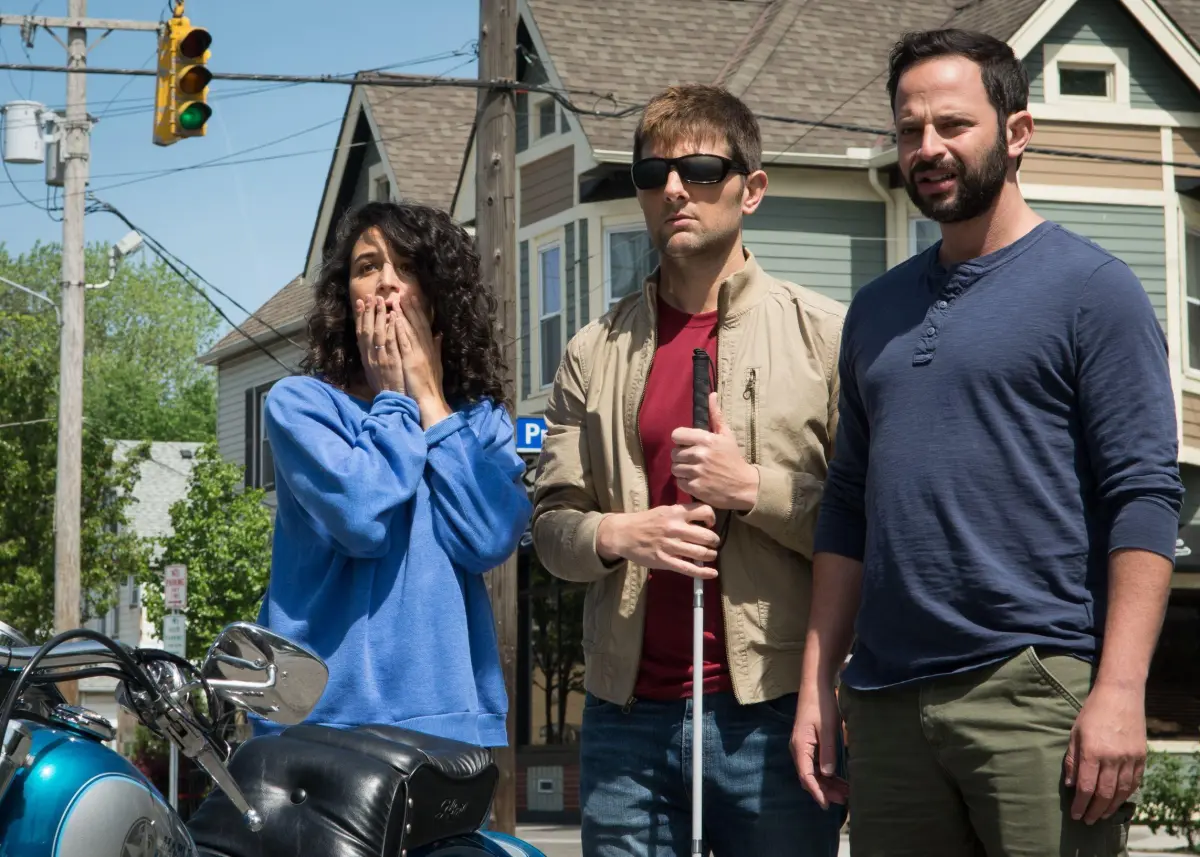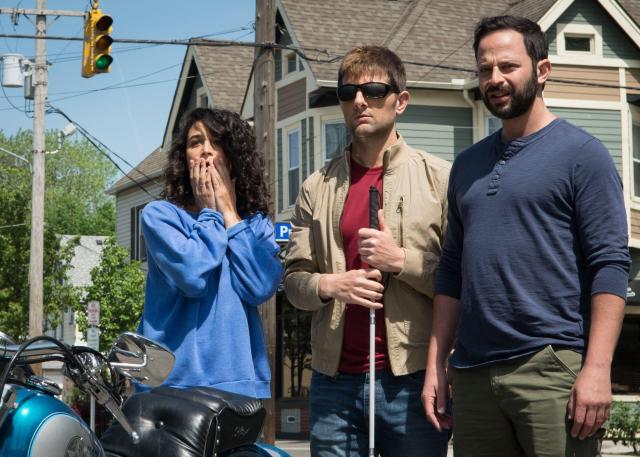Every year, Gamechanger Films awards one SXSW feature directed by a woman with their prize, which includes $2,500 cash. Although there were many films directed by women this year, the honor went to Sophie Goodhart’s comedy, My Blind Brother, starring Nick Kroll, Adam Scott, Jenny Slate, Zoe Kazan, and Charlie Hewson. The film is the story of Robbie (Scott), a blind athlete hell-bent on breaking records and making news, and his brother, Bill (Kroll), who feels an obligation to accompany him as his guide. Both men meet Rose (Slate), a recently single woman with a guilt complex, who dates Robbie but favors Bill. Kazan and Hewson play Rose and Bill’s no-nonsense best friends, who have no problem pointing out Robbie’s single-minded narcissism.
Goodhart originally directed the short the film is based on 13 years ago, but has since extended the premise considerably. Since then, she’s worked primarily as a screenwriter, although while about 5 of her scripts have been greenlit, only 2010’s Locksmith was produced. Her feature debut as a director took some time, ultimately coinciding with her own pregnancy (she was 8 months along by the time they wrapped and spent the last days directing on a row boat), but the results were impressive. Rather than approach the material as black humor with shock value, the movie has an underlined current of sweetness, enhanced by the likable cast she assembled in Ohio.
Hewson was actually the first actor approached for his role of GT, playing a blind drug dealer based on a person Sophie knew in real-life. Kroll, Scott, and Slate were assembled together, with Slate ultimately asking Kazan’s boyfriend for her number so she could ask her to play her best friend, Francie. Although time was limited, Scott and Hewson did research on their own to play blind men—Scott while on location in New Zealand, and Hewson shadowing a recording artist in New York who Goodhart knows. To write the screenplay, Goodhart did research on blindness, sibling relationships, and especially sportsmen, “interested in the kind of fierce determination, focus and need to shut down other voices” that Scott’s character demonstrates throughout the film.
Goodhart also drew inspiration from two other real-life sources for the film: the story of a blind swimmer and her relationship with her sister, who was diagnosed with a chronic illness at a young age. Goodhart explains the reason she ultimately told the story of two brothers, rather than sisters saying “I think I was consciously making the decision to try to separate myself from the characters a little bit, and also, the story I read about the blind swimmer had been about two men. But I wonder if it was really about me just trying to put distance in. But also there is a kind of attention-seeking neediness that Bill’s character shows, and I liked the idea of that being a man, as opposed to seeing a woman doing that, because there could be men out there who say ‘that’s just the way women are.’ I would have been uncomfortable doing that, even though it probably is a shame that I would think of that.”
Goodhart had the added challenge of writing a screenplay for multiple actors who are also professional screenwriters. Slate and Kroll are both comics who write most of their own material, and Kazan was critically praised for her meta-comedy, Ruby Sparks. Kazan, a direct and candid actress, explained the experience of reading others screenplays now that she has that experience:
I think that being a writer myself has simultaneously made me harder on scripts I read and easier on them. Having had a movie made, I think I watch films with a lot more forgiveness than I did before. Now I’m like, ‘A lot of people put a lot of hard work into it, so even if it isn’t my taste, it represents someone’s hopes and dreams.’ And then I think that when I read a script now, I’m more attuned to laziness, but I thought Sophie’s script was wonderful and really unusual, both in what she was trying to talk about and her sensibilities, which were really clear in her short film, which is sort of a short version of this film. I thought that her handling of the comic-tragic tone was really adept, which is a large part of why I wanted to sign on.
Slate, who has been on a hot streak since starring in Obvious Child and Married (along with guest appearances on Scott and Kroll’s Parks and Recreation and Kroll Show) has also become a tough actress thanks to her discerning ear for comedy:
I think in my own way, similar to Zoe, I’m pretty hard on the comedy. When I read a script, if the comedy feels recycled or borrowed or just part of a trend—if it isn’t a new voice, it’s a big turn-off for me, because I think comedy is its best when comedy is fresh and alive. So while it can be funny to hear a classic joke, I don’t want to be the person telling it, and I feel shame in repetition. I think what I look for are new ways to be funny, and I identify with it when it is being expressed in a new way. I think that writing comedy, I would never say anything on stage I would be too embarrassed to say in real life. I would never say something for effect and then be embarrassed about in a conversation. It would be attention-drawing and cheesy. So I look for the same thing in scripts, because while I’m not necessarily the most honest person all the time, it feels like pulling teeth to say a line I don’t believe in and makes me feel like shit, so I’d rather just not say any line at all. So when I read Sophie’s script, I found myself saying everything out loud, which is a good sign.
Goodhart admits that her favorite scenes to write we actually between best friends Rose and Francie, as they are somewhat based on her real life best friend:
I have a best friend, and she sees me in a way that makes me feel loved and known, and I can say terrible things to her and she can say terrible things to me, and that doesn’t make us bad friends. It just allows us to show the terrible underbelly and still feel loved, and so Francie and Rose’s scenes were my favorite to write because there are some lines of theirs which make me so happy. So I actually thought Francie is the one person who allows Rose to tell the truth in her life, and Rose is so uncomfortable with navigating how to be good and be honest and all of that stuff, and Francie is like, ‘You will be loved whatever … we are going to love you whatever fucking happens. So just tell the truth.’
And just as Francie provided the non-judgmental sounding board for nervous Rose, GT offers the same honest perspective to Bill, a refreshing part of the character for Charlie Hewson, who described GT as “a pleasure, because Bill deserves it because I think that character is such a sweetheart. And it was fun to say ‘I don’t know man, that guy sounds like a dick’ about Robbie. Because everyone needs someone to commiserate with. So that came very naturally because he is the kind of friend I like to be.”
We spoke the day after the film’s premiere, where the cast and director took to the stage for a Q&A. While everyone impressed and entertained (including Kroll, who answered the tired “who are you wearing” asked of Kazan and Slate … Old Navy top to bottom), Kazan was especially vocal when answering what the movie isn’t about blindness or being “handicapped,” receiving a round of applause when she responded:
I think there is some reason differently abled is becoming something people say. We all have different toolkits that we come with to the world, and I think everyone up here has felt like an outsider as certain points and felt special at certain points. So I don’t think you have to have any specific personal experiences to have empathy. We are all humans, capable of cruelty and kindness. I think Sophie just made a really cool movie about people, and blindness, even though it is in the title and part of what the movie is about, it isn’t front and center of what this movie is really talking about.
During the interviews for the film, Kazan expanded on what she thought the movie was really about:
I think it’s a lot about shame and knowing what you want, and there is a kind of clearness in Robbie about wanting to be perceived a certain way and not let his blindness get in the way of his achievements, and there is a more uncertain path to get what Jenny and Nick’s characters want. They have put blocks in front of themselves and part of what the movie is about it clearing away those blocks. Everyone can see Robbie’s blindness, but no one can see what challenges are for Rose and Bill.
Lesley Coffin is a New York transplant from the midwest. She is the New York-based writer/podcast editor for Filmoria and film contributor at The Interrobang. When not doing that, she’s writing books on classic Hollywood, including Lew Ayres: Hollywood’s Conscientious Objector and her new book Hitchcock’s Stars: Alfred Hitchcock and the Hollywood Studio System.
—Please make note of The Mary Sue’s general comment policy.—
Do you follow The Mary Sue on Twitter, Facebook, Tumblr, Pinterest, & Google +?









